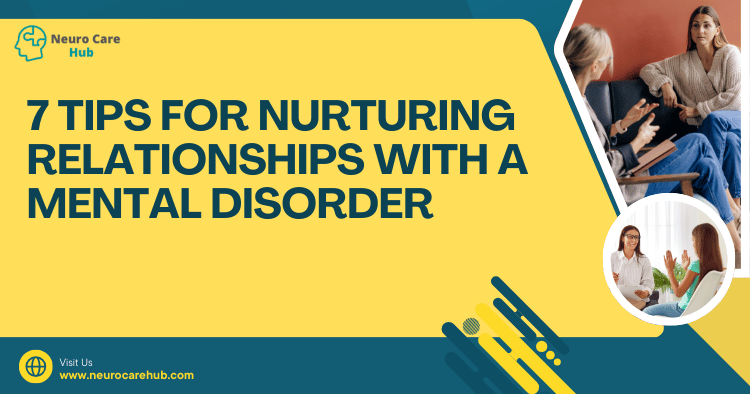7 Tips for Nurturing Relationships with a Mental Disorder
Tip 1: Communicate Openly
It’s essential to express your feelings and thoughts clearly to your loved ones.
Tip 2: Set Boundaries
Establishing healthy boundaries helps maintain a balanced relationship.
Tip 3: Seek Professional Help
Consider involving a therapist or counselor to facilitate discussions.
Tip 4: Practice Patience
Understand that progress takes time, and patience is key.
Tip 5: Educate Yourself and Others
Knowledge about mental disorders can foster empathy and support.
Tip 6: Engage in Activities Together
Participating in enjoyable activities can strengthen your bond.
Tip 7: Prioritize Self-Care
Taking care of yourself is crucial in maintaining healthy relationships.
Table of Contents
- Understanding Mental Disorders
- Communicate Openly and Honestly
- Educate Your Loved Ones
- Set Healthy Boundaries
- Seek Professional Help Together
- Practice Self-Care
- Find Supportive Communities
Understanding Mental Disorders
Living with a mental disorder can be challenging, not just for the individual but also for their loved ones. Mental disorders, which include anxiety, depression, bipolar disorder, and more, can affect emotions, thoughts, and behavior. Understanding the nature of these conditions is the first step in nurturing relationships. Recognizing that these disorders are not a reflection of one’s character can foster empathy and patience among friends and family.
Resources to Explore:
Communicate Openly and Honestly
Communication is the cornerstone of any healthy relationship, and it becomes even more crucial when mental health issues are involved. Be open about your feelings, symptoms, and needs. Encourage your loved ones to share their thoughts and feelings too. This two-way communication helps build trust and understanding.
Tips for Effective Communication:
- Choose the right time and place for discussions.
- Use “I” statements to express your feelings (e.g., “I feel overwhelmed when…”).
- Be patient and listen actively.
Educate Your Loved Ones
Sometimes, loved ones may not understand what you are going through. Taking the initiative to educate them about your mental disorder can help reduce stigma and misinformation. Share articles, books, or documentaries that explain your experience. The more informed they are, the better equipped they will be to support you.
Resources for Education:
Set Healthy Boundaries
Setting boundaries can be challenging, especially when emotions run high. However, it is essential to communicate your limits clearly. Boundaries help protect your mental health and ensure that your relationships remain healthy. Be specific about what you can and cannot handle emotionally, and encourage your loved ones to do the same.
Type of Boundary Example Emotional “I need some time alone when I feel overwhelmed.” Physical “Please don’t touch me when I’m upset.” Time “I can talk for 30 minutes, but then I need a break.”
Seek Professional Help Together
Sometimes, the best way to nurture relationships is to seek help from a professional. Consider couples therapy, family therapy, or support groups. A trained therapist can provide insights and coping strategies that can strengthen your relationship and enhance understanding.
Resources for Finding Help:
Practice Self-Care
Taking care of your mental health is essential for maintaining healthy relationships. Engage in activities that nourish your mind and body, such as exercise, meditation, or hobbies. When you prioritize your well-being, you are better equipped to nurture your relationships.
Self-Care Ideas:
- Journaling your thoughts and feelings.
- Practicing mindfulness or yoga.
- Spending time in nature.
Find Supportive Communities
Connecting with others who understand what you’re going through can be incredibly validating. Look for support groups, whether in-person or online, where you can share experiences and tips for managing relationships while living with a mental disorder. These communities can offer empathy and advice that friends and family may not fully grasp.
Online Support Groups:
FAQs
Q: How do I explain my mental disorder to my partner?
A: Start by choosing a calm moment to discuss your feelings. Use simple language and share resources that can help them understand the condition better.
Q: What if my loved ones don’t understand my disorder?
A: Be patient. Sometimes, it takes time for people to grasp the complexities of mental health. Continue to communicate openly and share educational resources.
Q: How can I support someone with a mental disorder?
A: Listen without judgment, educate yourself about their condition, and encourage them to seek help if needed. Respect their boundaries and be there when they need you.
Also Look For:
For more insights into how mental health intersects with neurological care, consider exploring these topics:
- Top 5 Reasons Neuro Care is Essential in Modern Medicine
- Top 5 Myths About Neuro Care Debunked
- Top 5 Ways Caregivers Enhance Neuro Care Effectiveness
- Top 5 Benefits of Early Intervention in Neuro Care
These resources can provide valuable knowledge about the importance of addressing both mental and neurological health for holistic well-being.
Sure! Please provide the Markdown content you would like me to convert to HTML.






